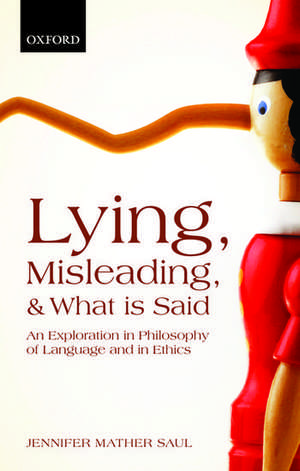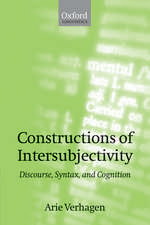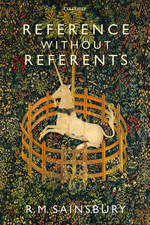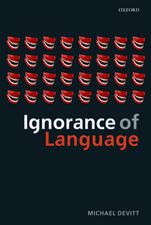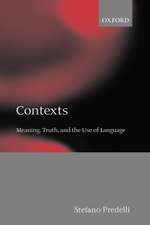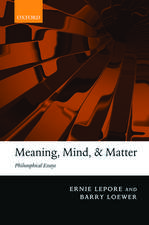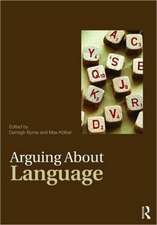Lying, Misleading, and What is Said: An Exploration in Philosophy of Language and in Ethics
Autor Jennifer Mather Saulen Limba Engleză Paperback – 2 iul 2015
| Toate formatele și edițiile | Preț | Express |
|---|---|---|
| Paperback (1) | 221.91 lei 31-37 zile | |
| OUP OXFORD – 2 iul 2015 | 221.91 lei 31-37 zile | |
| Hardback (1) | 494.91 lei 31-37 zile | |
| OUP OXFORD – 25 oct 2012 | 494.91 lei 31-37 zile |
Preț: 221.91 lei
Preț vechi: 252.27 lei
-12% Nou
Puncte Express: 333
Preț estimativ în valută:
42.47€ • 44.17$ • 35.06£
42.47€ • 44.17$ • 35.06£
Carte tipărită la comandă
Livrare economică 03-09 aprilie
Preluare comenzi: 021 569.72.76
Specificații
ISBN-13: 9780198744115
ISBN-10: 0198744110
Pagini: 160
Dimensiuni: 146 x 216 x 10 mm
Greutate: 0.21 kg
Editura: OUP OXFORD
Colecția OUP Oxford
Locul publicării:Oxford, United Kingdom
ISBN-10: 0198744110
Pagini: 160
Dimensiuni: 146 x 216 x 10 mm
Greutate: 0.21 kg
Editura: OUP OXFORD
Colecția OUP Oxford
Locul publicării:Oxford, United Kingdom
Recenzii
Saul has done philosophy a great service by bringing into conversation two subfields that have long remained isolated from one another, namely, philosophy of language and moral philosophy.
In this excellent and enjoyable book, Jennifer Saul explores issues at the convergence of the philosophy of language and ethics. Her book is an excellent addition to a growing literature of what might be considered applied philosophy of language. . . . a rewarding read that is sure to provoke interesting dialogue about how to define lying, our notions of what is said, and the moral difference between lying and misleading.
Analytic philosophy of language is rightly admired for its clarity, logical acumen and attention to subtle linguistic detail. Too few of us, however, pursue the connections between philosophy of language on the one hand, and issues in value theory on the other. Fewer still attempt to shed light on problems in the philosophy of language by drawing on ethics. Jennifer Saul, a leading voice among traditionalists, attempts just this in her latest book. . . . In our view, Saul's experiment is a smashing success. It has been years since we read such a pioneering and stimulating book in our sub-field.
Saul's writing is clear and lively, presenting theoretical notions and debates in a manner that should be accessible to readers from a variety of backgrounds. . . . makes real progress on some important philosophical questions, and is an entertaining and rewarding [book] to boot.
In this excellent and enjoyable book, Jennifer Saul explores issues at the convergence of the philosophy of language and ethics. Her book is an excellent addition to a growing literature of what might be considered applied philosophy of language. . . . a rewarding read that is sure to provoke interesting dialogue about how to define lying, our notions of what is said, and the moral difference between lying and misleading.
Analytic philosophy of language is rightly admired for its clarity, logical acumen and attention to subtle linguistic detail. Too few of us, however, pursue the connections between philosophy of language on the one hand, and issues in value theory on the other. Fewer still attempt to shed light on problems in the philosophy of language by drawing on ethics. Jennifer Saul, a leading voice among traditionalists, attempts just this in her latest book. . . . In our view, Saul's experiment is a smashing success. It has been years since we read such a pioneering and stimulating book in our sub-field.
Saul's writing is clear and lively, presenting theoretical notions and debates in a manner that should be accessible to readers from a variety of backgrounds. . . . makes real progress on some important philosophical questions, and is an entertaining and rewarding [book] to boot.
Notă biografică
Jennifer Saul is Professor of Philosophy at the University of Sheffield. She works in Philosophy of Language, Feminist Philosophy and Philosophy of Psychology. She is especially interested in finding ways that philosophical debates (like that over what is said) connect up with real-world concerns (like lying and misleading). And she likes nothing better than an excuse to discuss political scandals in great detail. She is also the author of Simple Sentences, Substitution, and Intuitions (Oxford University Press 2007) and Feminism: Issues and Arguments (Oxford University press 2003). She is Director of the Implicit Bias and Philosophy Research Network.
